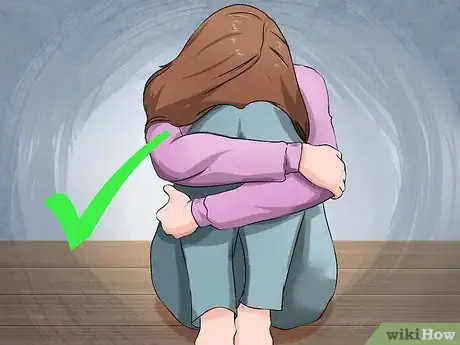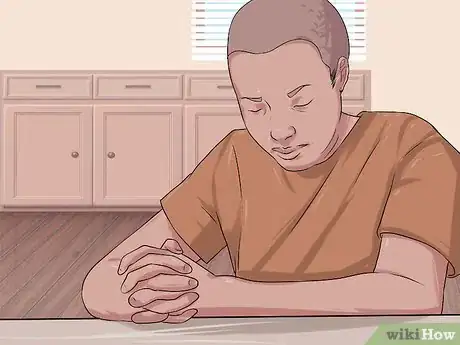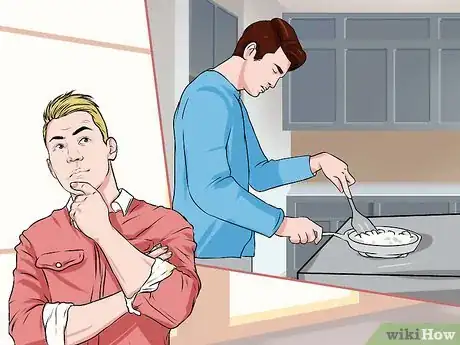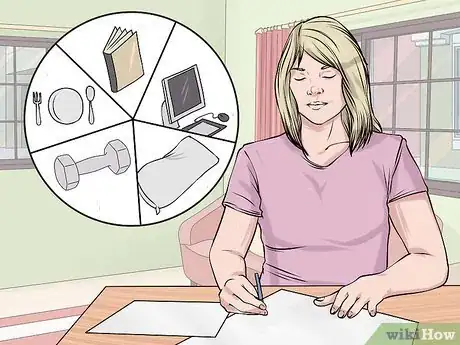This article was co-authored by Moshe Ratson, MFT, PCC. Moshe Ratson is the Executive Director of spiral2grow Marriage & Family Therapy, a coaching and therapy clinic in New York City. Moshe is an International Coach Federation accredited Professional Certified Coach (PCC). He received his MS in Marriage and Family Therapy from Iona College. Moshe is a clinical member of the American Association of Marriage and Family Therapy (AAMFT), and a member of the International Coach Federation (ICF).
There are 16 references cited in this article, which can be found at the bottom of the page.
This article has been viewed 43,435 times.
The most stressful life event is the death of a spouse; the second most stressful is divorce.[1] In addition to the financial and emotional upheaval of divorce, the time that it takes to drudge the misery of your relationship through the courts can take a serious toll on your health and well-being.[2] To counterbalance that effect and help you deal with the pain, you need a survival plan. Learn how to deal with the pain of your divorce and feel positive about your life again.
Steps
Dealing with Your Feelings
-
1Be gentle with yourself. Divorce is a naturally painful process. Don’t make matters worse by being hard on yourself or expecting too much too soon. Take a few days to yourself, or with someone supportive, to vent or forget or whatever you need to do.[3]
- It may seem silly, but it can be helpful to indulge yourself during this time. Get a soothing massage. Take long, hot baths as you ponder your feelings. Drink tea by the fire. Don’t worry so much about managing the everyday right away, just care for yourself and accept the pain.
-
2Allow yourself to grieve. One of the most important relationships in your life is disintegrating. It’s normal and perfectly okay to feel like you should grieve. Depending on the particulars of your divorce, you may feel sadness, shock, despair, fear or anger among other emotions. There is no right way to grieve. Grieve in the way that feels most natural to you.
- It may make grieving easier to avoid your spouse, if at all possible, during this time. Find a new route to work if you usually see her each day. Put away the photo albums or mementos that make you cry each time you pass.
- You should let yourself feel what you must. However, don’t allow your feelings to be in the driver’s seat. Doing this can result in impulsive decisions and actions occurring that you later regret, such as showing up at your ex’s doorstep begging her to reconsider.
Advertisement -
3Surround yourself with supportive people. A support network is essential during divorce.[4] Reach out to or accept support from those around you who love and support you.
- Be sure that the confidants you select have your best interests at heart and are not simply interested in hearing gossip or badmouthing your ex. Seek out people who are positive influences that give you a healthy outlook on life and encourage you to make good decisions.[5]
-
4Handle stress in a healthy way. It can be tempting to turn to drugs, alcohol or other unhealthy behaviors during this difficult period in your life. These substances or activities may appear to numb your feelings, but it is only temporary. Find healthier methods of coping that boost your mood.[6]
- Examples of healthy coping methods may include phoning a friend when you feel particularly low, exercising, spending time outdoors or doing a hobby, or meditating to reduce stress and calm your mind.[7]
-
5See a mental health therapist to help process the divorce.[8] A counselor or therapist can be an invaluable source of support during your divorce. Don’t play into the irrational belief that seeking outside help means you’re weak. You need someone with whom you feel comfortable talking to and processing the events taking place in your life. A professional can help you understand what you’re feeling and make plans to move forward with your life when you’re ready.[9]
Coping with Change
-
1Journal. Keeping a journal can be a helpful way to unload your thoughts and feelings about the divorce. Getting what’s in your head down on paper can provide relief from what you’re feeling. What’s more, journaling is a great way to problem-solve.
- Try to devise solutions to some of the issues you write about in your journal. For example, if you notice you keep worrying about how you will get by financially, possible solutions may be to find a job or speak with a financial advisor who can help.
-
2
-
3Prepare for new roles. Divorce will bring with it a host of new responsibilities. Regardless of how long your were married, you have probably come to rely on your spouse in various ways. You must anticipate a major shift in what you may or may not be responsible for moving forward.
- Maybe your spouse often did all the cooking and laundry and now you are faced with learning these tasks as an older, single person. On the other hand, your spouse may have been the primary breadwinner and the divorce causes you to assess your skills, get a job, and develop your own financial security.[12]
-
4Do what's best for the children. Research has repeatedly shown that joint custody, in which children are able to split time between both parents rather than mostly living with one parent, is the best option for kids in fractured families.[13] These kids have feel more secure from continually being cared for by both parents, they are able to follow a healthy example, and they may grow up to be better problem-solvers.[14]
- Of course, this option may not be best in your case. Work with your family lawyer to determine which arrangement best suits your unique circumstances.
- If you do decide to co-parent, avoid allowing your feelings to overshadow the needs of your children. Strive to listen to and compromise with your ex in order to adopt consistent rules and disciplinary strategies for the kids.
Rebuilding After Divorce
-
1Create a routine. The dissolution of your marriage can turn your world upside down. It’s important to keep a regular schedule in order to maintain some aspect of structure and familiarity in this new chapter of your life.[15]
- Don’t clear your schedule of your regular girl’s night or personal training session. If you enjoy and look forward to these activities, maintain them for normalcy.
-
2Set realistic goals. The aftermath of divorce is a perfect time to think about yourself and the kind of life you would like to lead moving forward. The prospect of facing the world, no longer as one of two, but on your own, can be both exhilarating and terrifying. Make the decision to take advantage of your single status by setting goals that allow you to redefine yourself and live the life you want. Set a new small goal each week to boost your motivation.[16]
- Did you once have a dream of completing your college degree? Have you been putting off starting your own business or traveling to another country? Sit down with a pen and paper and create a step-by-step plan to reach your future goals. A weekly small goal may be researching schools or obtaining your previous college transcript.
- Still, you must be realistic about the goals you set and the feasibility of you accomplishing them. For example, you would want to take your children and any custody issues into consideration when thinking about starting a new career or relocating.
-
3Discover new passions. Another way to rebuild your life and redefine yourself is finding new interests. A divorce is an ending and a beginning. Establishing a new identity is significant in helping you move on. If you still keep up hobbies that you shared with your spouse, that’s fine, but try to find new activities to do that reflect your own desires.
- Have you always wanted to run a marathon? Learn a new language? Go for it! Maybe you could never have a pet due to your spouse's allergies--now might be a great time to get a cute puppy![17]
-
4Redefine your living space. Post-split you may be so busy trying to make it through each day that you take little notice to your surroundings. However, stop and take a look around you. Does your current living space represent who you are as a single person? Or, are you holding on to a coupled identity? Know that what your living space looks like and how it makes you feel are vital in your rebuilding.
- Your physical environment can have a huge impact on your mood, create or reduce stress, and influence your behavior or motivation.[18]
- You don't have to spend money to redefine your space. Pack away those things that make your upset or sad. Move around the furniture. Change out the curtains to make the space brighter or more airy. Add in some brightly-colored artwork or rugs to give you a major mood boost.[19] Grab that can of paint from the garage and touch up the walls.
-
5Take time developing your new romantic identity.[20] The dating game may have changed drastically since before you said "I do". Make an effort to survey your desires before entering into a new committed relationship.
- Once you feel ready to date, challenge to see someone outside your usual "type". For example, if you usually date conservative business types, see how you like a person who is more free-spirited and liberal.
- If you desire, choose to be single and work on yourself before jumping back into the dating world. Society is much more accepting of singles than decades ago. So, don't feel the need to quickly get attached.
- Take time every night to remind yourself of the good qualities you possess and the fact that you're a person worthy of love.[21]
Expert Q&A
-
QuestionIs life difficult after divorce?
 Moshe Ratson, MFT, PCCMoshe Ratson is the Executive Director of spiral2grow Marriage & Family Therapy, a coaching and therapy clinic in New York City. Moshe is an International Coach Federation accredited Professional Certified Coach (PCC). He received his MS in Marriage and Family Therapy from Iona College. Moshe is a clinical member of the American Association of Marriage and Family Therapy (AAMFT), and a member of the International Coach Federation (ICF).
Moshe Ratson, MFT, PCCMoshe Ratson is the Executive Director of spiral2grow Marriage & Family Therapy, a coaching and therapy clinic in New York City. Moshe is an International Coach Federation accredited Professional Certified Coach (PCC). He received his MS in Marriage and Family Therapy from Iona College. Moshe is a clinical member of the American Association of Marriage and Family Therapy (AAMFT), and a member of the International Coach Federation (ICF).
Marriage & Family Therapist Yes, but realize that pain means you still have room to grow. Accept that pursuing love always carries the risk of ending in heartache. If you let it, that pain will keep you stuck, and it will hold you back from the possibilities and opportunities that come your way. However, grief and healing take time, so it's important to be patient with yourself.
Yes, but realize that pain means you still have room to grow. Accept that pursuing love always carries the risk of ending in heartache. If you let it, that pain will keep you stuck, and it will hold you back from the possibilities and opportunities that come your way. However, grief and healing take time, so it's important to be patient with yourself. -
QuestionHow can I mentally prepare for a divorce?
 Jin S. Kim, MAJin Kim is a Licensed Marriage and Family Therapist based out of Los Angeles, California. Jin specializes in working with LGBTQ individuals, people of color, and those that may have challenges related to reconciling multiple and intersectional identities. Jin received his Masters in Clinical Psychology from Antioch University Los Angeles, with a specialization in LGBT-Affirming Psychology, in 2015.
Jin S. Kim, MAJin Kim is a Licensed Marriage and Family Therapist based out of Los Angeles, California. Jin specializes in working with LGBTQ individuals, people of color, and those that may have challenges related to reconciling multiple and intersectional identities. Jin received his Masters in Clinical Psychology from Antioch University Los Angeles, with a specialization in LGBT-Affirming Psychology, in 2015.
Licensed Marriage & Family Therapist Divorce is usually an emotionally intense and difficult process. Aside from the necessary legal preparations, it would be ideal for people to also focus on their mental health by seeing a licensed therapist, regularly interfacing with their support network and upkeeping self-care activities that address both emotional and physical well-being.
Divorce is usually an emotionally intense and difficult process. Aside from the necessary legal preparations, it would be ideal for people to also focus on their mental health by seeing a licensed therapist, regularly interfacing with their support network and upkeeping self-care activities that address both emotional and physical well-being.
Warnings
- Know that feeling sad or grieving over your divorce is common. However, if your feelings contribute to hopelessness about the future, extreme fatigue, sleep disturbances, appetite changes, or suicidal feelings, you may need to see a doctor for depression.⧼thumbs_response⧽
References
- ↑ https://www.healthstatus.com/health_blog/depression-stress-anxiety/top-5-stressful-situations/
- ↑ Jin S. Kim, MA. Licensed Marriage & Family Therapist. Expert Interview. 14 May 2019.
- ↑ http://www.pbs.org/thisemotionallife/blogs/7-steps-overcome-your-divorce
- ↑ http://www.webmd.com/sex-relationships/features/life-after-divorce-3-survival-strategies
- ↑ Jin S. Kim, MA. Licensed Marriage & Family Therapist. Expert Interview. 14 May 2019.
- ↑ http://www.helpguide.org/articles/family-divorce/coping-with-a-breakup-or-divorce.htm
- ↑ Jin S. Kim, MA. Licensed Marriage & Family Therapist. Expert Interview. 14 May 2019.
- ↑ http://www.helpguide.org/articles/family-divorce/coping-with-a-breakup-or-divorce.htm
- ↑ Jin S. Kim, MA. Licensed Marriage & Family Therapist. Expert Interview. 14 May 2019.
- ↑ http://www.pbs.org/thisemotionallife/blogs/7-steps-overcome-your-divorce
- ↑ https://www.firstwivesworld.com/index.php/resources-articles/item/3660--spiritual-principals-to-help-you-navigate-divorce
- ↑ http://www.webmd.com/sex-relationships/features/life-after-divorce?page=3
- ↑ http://www.apa.org/monitor/jun02/custody.aspx
- ↑ http://www.helpguide.org/articles/family-divorce/co-parenting-tips-for-divorced-parents.htm
- ↑ http://www.helpguide.org/articles/family-divorce/coping-with-a-breakup-or-divorce.htm
- ↑ http://www.webmd.com/sex-relationships/features/life-after-divorce-3-survival-strategies?page=2
- ↑ http://www.mentalhealthamerica.net/separation-and-divorce
- ↑ http://www.takingcharge.csh.umn.edu/explore-healing-practices/healing-environment/what-impact-does-environment-have-us
- ↑ http://sites.psu.edu/siowfa15/2015/10/21/do-colors-affect-emotion/
- ↑ http://www.webmd.com/sex-relationships/features/life-after-divorce?page=3
- ↑ Moshe Ratson, MFT, PCC. Marriage & Family Therapist. Expert Interview. 7 August 2019.










































































